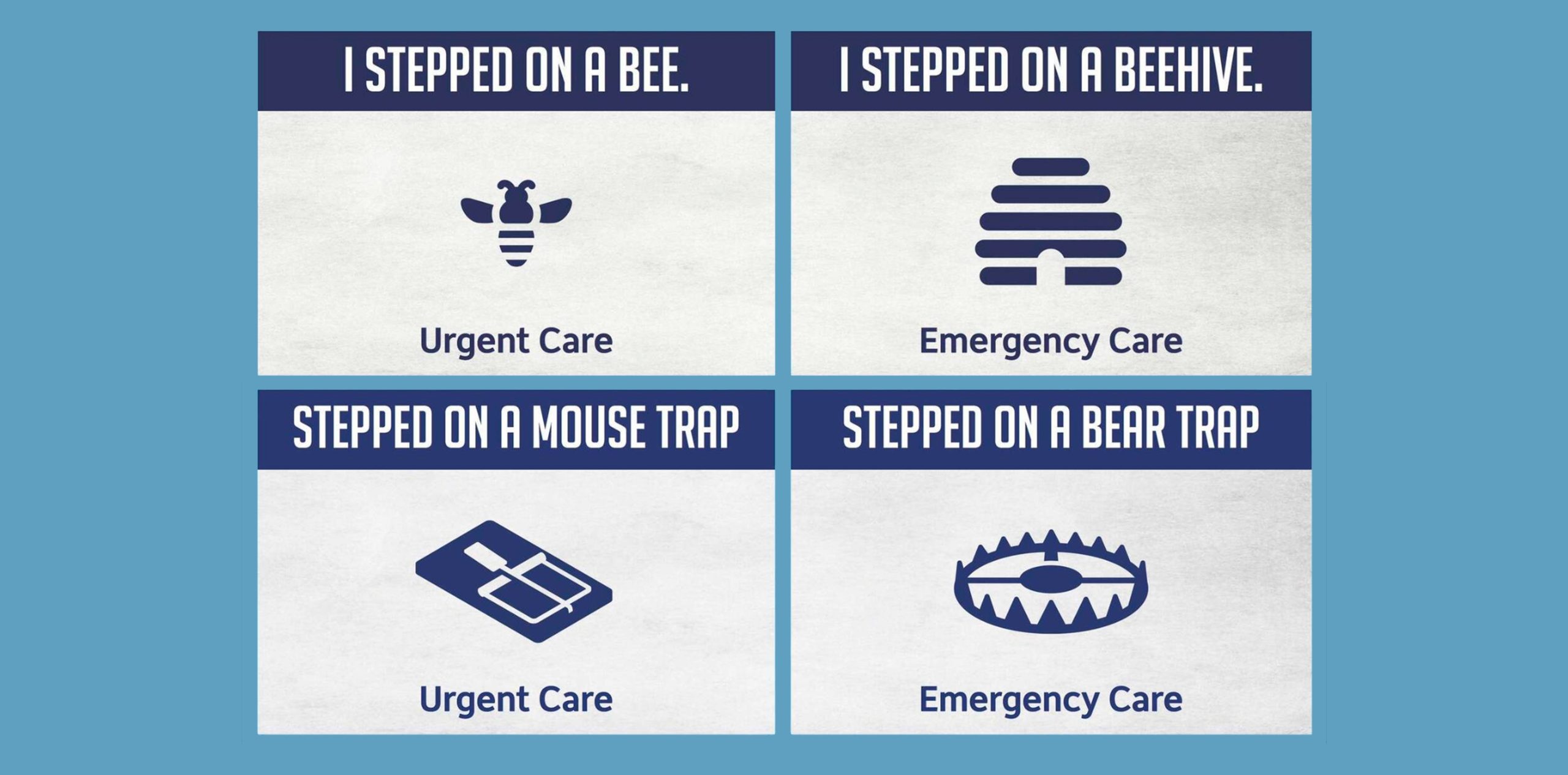Persisting with a flawed narrative around UCCs weakens the RACGP politically.
It’s hard to see the strategic upside of sending your president on to national TV to face the federal health minister on the important evolving issue of urgent care clinics with a set of arguments that don’t stack up in any way.
This occurred on Wednesday night on the ABC’s 7.30.
Surely even a good proportion of what the college seems to see as its core demographic of bricks-and-mortar general practice owners (and the GPs working in these practices) must have been scratching their heads at the arguments RACGP president Dr Nicole Higgins was trying to prosecute:
- that UCCs almost entirely replicate what a normal GP practice does
- that if the federal government spent the $720 million being spent on UCCs in “general practice” (never mind that her own members work in UCCs) then there won’t be any problem getting in to see your normal GP at any time
- that each UCC visit at a cost of about $300 per consult to the federal government can be substituted easily for a GP visit cost of just $43 per visit, thus creating much greater value to the public – and clearly showing up UCCs as wasteful duplication
- UCCs don’t take any pressure off local EDs (actually, she may have this one right, time will tell)
Here’s the transcript of some of what Dr Higgins said.
“These urgent care centres were designed to take the pressure off our emergency departments, but what they’re doing is also, if you like, duplicating the services that we’ve already got, which exist in general practice …
“If we funded general practice to the tune of what we’re doing urgent care centres, we’d be able to increase that capacity and see people on the day and [maintain] continuity of care seeing a regular GP…
“Urgent care centres are promoted as being free, but they’re not. They are so much more expensive [per] episode of care. Say, if you’ve got a [a child with a sore ear], if you took your child to the GP [it will cost] just under $43. If you took your child to the urgent care centre, it would cost the taxpayer just under $300. If you took your child to the emergency centre, that’s around $650. So you can see it cost the taxpayers so much more than somebody seeing their GP.”
Unfortunately for Dr Higgins and the college, the ABC reporter decided to edit in a few right of replies to her arguments from federal health minister Mark Butler and if any patients were paying attention (it was all pretty dull stuff so the college probably doesn’t have to worry too much) they would have immediately picked up some fundamental problems with her arguments.
The first problem is that UCCs see a big proportion of their patients outside normal GP practice hours – after 5pm on weekdays and after 12pm on weekends. The show said that over a third of UCC consults were out of normal GP hours, but TMR has talked to centres which claim the figure can be as high as 40%.
So up to 40% of Dr Higgins’s argument about UCCs simply duplicating what normal GP practices can do is immediately, even embarrassingly, wrong.
But that does leave us with 60-70% of UCC consults in play as potentially duplicating what a normal GP practice can do.
The problem with those consults of course, which the show did not get into, is that a large percentage of UCC presentations are consults a normal GP practice won’t or can’t do – such as a broken arm or a severe cut requiring a lot of stitches. A further large percentage of UCC presentations are patients who can’t get in to see their local GP when they want or need to, but don’t want to go to ED.
Notably, and not talked about on the show either, nearly all UCCs are co-located with a normal GP practice and patients are triaged between the services. That triage data is being carefully audited by the federal government to make sure that what Dr Higgins claims is happening isn’t happening. On the data available so far, it doesn’t look like it is.
TMR visited a few UCC centres a couple of weeks back to check on all their processes and the triaging in the centres we saw is pretty well governed and strict.
At least half of the consults in normal general practice hours are simply not consults a normal practice is going to see. And of those that overlap, how many are worried patients or parents who would very likely have gone to an ED because they couldn’t get to see their local GP?
I think we might be getting down around the possibility of 10-20% duplication of services at best, which is a long way off the near 100% Dr Higgins seemed to be pushing.
Even an observant patient watching that program would have done some of the maths and wondered what this strange group representing GPs around the country was getting at. Certainly one that had been seen at a UCC would probably be sceptical.
Finally, to the idea that spending another $240 million per year (which converts roughly to the $740 million the government is spending over three years on UCCs) would solve the GP access problem overnight.
The total MBS GP funding for GPs is somewhere north of $8 billion per annum. Adding $240m to that each year? Every bit extra is needed and it’s going to help for sure. But it’s not even going to put a scratch on our current GP access problem.
Even if the government did turn around and increase MBS rebates to make up for 10 years of freezing them (they won’t), it’s not going to help the access problem.
The Greens came up with that sort of money and more this week in their magical Robin Hood healthcare platform. It’s a fun read if you like fantasy.
The access problem is about a shortage of GPs more than it is about how much we are paying them, and that’s a long-term fix.
I’m laying into the college so harshly here because it is a vital organisation serving general practice and it does deliver a lot of important services to its members pretty well.
But if it wants to retain advocacy as member value pillar it needs to be playing the game much better.
Its position on UCCs is putting at significant risk its overall credibility with patients, a lot of its own members and, most importantly, the federal government.
Patients and members won’t be such a big problem, in the short term at least.
Members have to pay their dues if they want their CPD, their letters and enhanced MBS rebates.
But having done a tonne of work in the last five years to address access and engagement with their members, and having turned around significantly what members think of them in that time, the board might want to think about just how stupid they have to make themselves look in the eyes of the government and the public before their members start turning on them again.
Patients aren’t known to follow the nuances of the politics of medicine and general practice.
To this end you could say the college has done an amazing job in the last five years in engaging patients politically in their crisis. A lot of this followed a pretty bold strategy of abandoning bulk billing en masse because the model was becoming non-financial.
En masse, patients will never be engaged enough to be doing the analytics and asking, “hang on, that argument being made by the president of that doctor group does not add up”.
But whether UCCs are duplicating GP services or not, does the college not see that patients are already deeply in love with UCCs? That anything they do publicly (like on national TV) to trash them will at first fall first on deaf ears and, if they persist, eventually might start degrading any brand with patients that the organisation has cleverly managed to build?
That brings us to government where the college does have to maintain brand reputation, including an air of professional competence, much more carefully if it wants to be heard in Canberra.
The federal government sees the college arguments against UCCs as banal, defensive, ignoring patient’s needs and without any basis in fact. That it’s unconstructive grandstanding for grandstanding’s sake. It thinks the college is trying to woo members by trying to look tough instead of engaging in rational argument.
The government is currently wondering whether the college is a group it should be meaningfully bringing into the tent on its bigger plans for the future.
And the next couple of years are the years the college really needs to be in that tent.
Related
Of course, the college has to make some openly hostile stands against the government on a few key issues.
GPs continue to be underfunded woefully and the government’s tactics to deal the problem so far include a fair bit of rhetoric and hot air about the future and minor funding changes such as the triple bulk billing incentive, which is a Band-aid initiative at best.
UCCs aren’t what the government say they are – a solution to our ED crisis – but it’s clear they aren’t duplicating GP services either.
We are only spending $240m a year on them; patients love them and attend them in droves; they employ a lot of GPs and RACGP members (over 200 at least); and the government loves them for what they are doing politically and is clearly not going to stop the program.
To stress again, the jury is out on whether UCCs can help solve our ED crisis and what their actual value to the system might end up being.
Butler even acknowledged this point to some degree in his 7.30 interview.
“We don’t expect that suddenly hospital ED presentations are going to start reducing,” he said.
“In Australia, there are a whole range of reasons why people are going to hospital. We are getting older, there’s more chronic disease [and] we know from clinicians that there’s still a lot of deferred acuity in the system because of covid … So pressure is going to remain in hospitals for some time.”
Nice way to buy some time.
The college is being outmanoeuvred here. At what point does its board reassess the brand damage it’s doing by prosecuting flawed arguments?
UCCs might not be doing what the government says they are doing but they’re not doing what the college says they are doing either.





